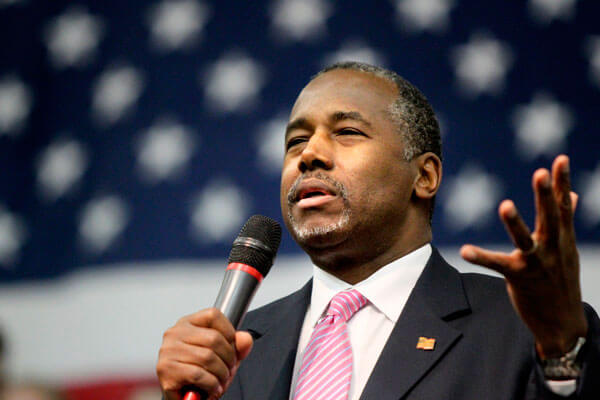Maybe in the normal white heat of conservative chatter he’s regularly contributing in the odious manner we’ve come to expect, but Dick Cheney doesn’t seem to have much of a mainstream presence these days. The strange trajectory of GOP affairs currently, though, in the run-up to 2016, cannot but bubble up Cheney’s name, in the particular context of one of the party’s aspiring presidential nominees who, according to recent polls, is among the Republican faithful’s leading choices. That Cheney would not be very enamored of Dr. Ben Carson as their nominee isn’t a tough call to make.
Some years ago, when Gen. Colin Powell’s name had been tossed in as a probable Republican presidential contender for 2008, Cheney made clear his objection to any serious consideration of such a possibility. Cheney would also ridicule Powell, to the extent of declaring that where GOP business was concerned, reptilian Rush Limbaugh had more leadership creds than the former secretary of state.
Although there generally tends to be no limit to the outrageous utterances we’ve had from Cheney (he seems determined, for instance, to be the most shamelessly unbending protagonist about how right was the invasion and occupation of Iraq), we suspect he would likely keep it within the realm of policy differences in rationalizing his ‘dis’ of Powell. But we know better. Even if he tried to, we’re not about to buy any attempt by Cheney to frame the king-sized sneer he reserved for Powell as different from what has precipitated an untrammeled vengeance against President Obama in the Republican / Tea Party sector.
Carson, whether or not he cares to acknowledge it, is no less a misfit in both the Republican power enclave and the party’s support base than was Powell. Carson’s emphasis on his own religious moorings has evidently found resonance among religious conservatives, and has been working for him both in terms of small-donation campaign funding and encouraging poll results. But that demographic subset, wherein reportedly lies the bulk of Carson’s support, loses its punch in the overall Republican / Tea Party electorate. Voter preference on that side of the fence has been even more starkly defined ever since the Obama phenomenon became etched into this country’s social history. Feigning ignorance (if that’s what it is) of the ethnic divide as the main driver of Obama-targeted vitriol from that quarter would only be foolhardy fantasizing on the part of Carson and his loyalists.
Carson is perhaps buoyed in this quest of his by the experience of a Tim Scott, the South Carolina senator who is very much an outlier as African American politicians go, in his espousal of the rabid right values the Tea Party represents (the Tea Party, lest we forget, having been spawned by racially inspired outrage directed at the first African American president, thinly disguised as a revolt against “Obamacare”). The example of Edward Brooke, the first person of color, and Republican, popularly elected to the Senate in 1966, doesn’t figure to be a Carson-type inspiration, so much ideological expanse separating the two. Elected for two terms to represent Massachusetts, Brooke’s label as a moderate happened at a time in the GOP when that characterization didn’t have the “kiss of death” stigma it carries today.
But here’s the thing about the color component in the GOP of today. If white Republicans of moderate or progressive bent have just about given up hope that any such ideological strain can have meaningful representation in today’s party profile, why would non-whites of similar philosophical persuasion believe there’s any chance of their influencing a shift from the party’s anchorage well to the right on the ideological spectrum? Clearly a Ben Carson signals, with his Republican affiliation, that he subscribes to most, if not all of the laundry list of rigidly conservative positions inimical to the interests of most people of color: pro-big business, not particularly sensitive to labor, anti-tax increase on the wealthy, indifferent to environmental concerns, anti-choice for women, etc.
Positioning himself in that space, Carson obviously stakes his presidential run on a premise of color blindness — that his own ethnicity would not affect support from the predominantly white bloc where conservative values mostly find favor. It’s a roll of the dice in which we don’t think the odds are with Carson.
As we’ve many times commented here, the election of Barack Obama, more than marking how far we had advanced, dramatically highlighted how far we had yet to go. The blistering, non-stop outpouring of hate toward this presidency should be anything but a confidence boost for Carson, seeing as how those depths of ugly have emanated from the very element in the society to which Carson now makes pilgrimage.

















